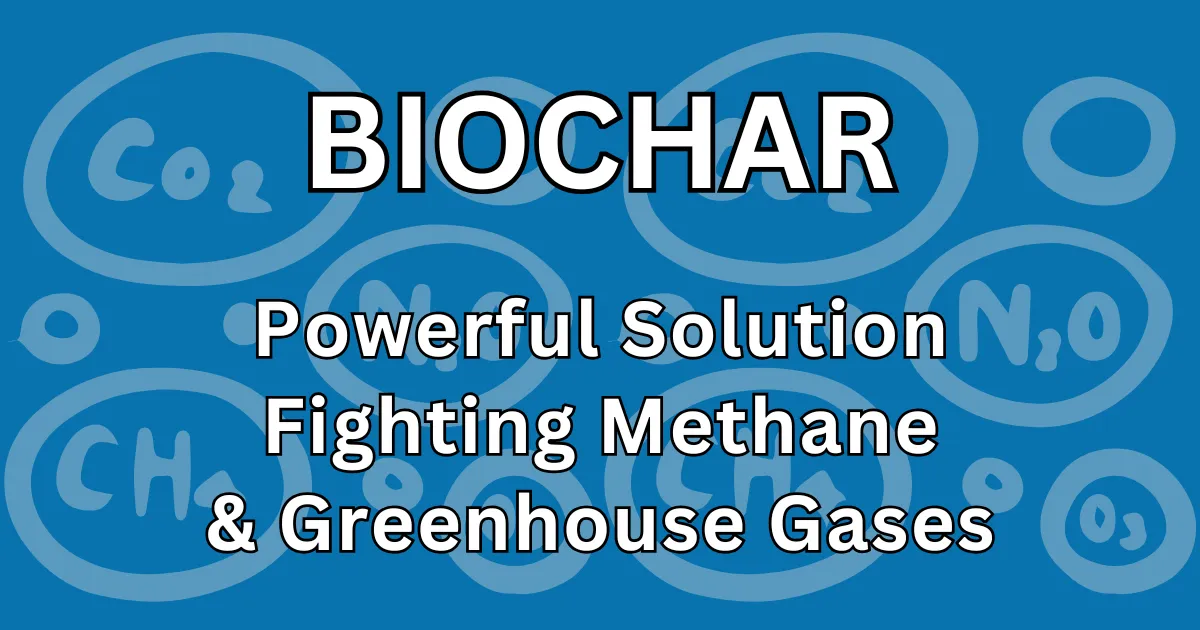Learn how biochar is created, how it works to reduce greenhouse gases like methane, and why it's gaining traction as a sustainable climate solution.
As the climate crisis drives demand for innovative ways to reduce greenhouse gases, biochar has emerged as a versatile, sustainable solution with the potential to address multiple environmental challenges at once. Created from organic waste, biochar not only captures carbon but also helps to combat methane emissions—a greenhouse gas more potent than carbon dioxide—making it an effective tool for industries looking to make measurable climate impacts.

What Is Biochar?
Biochar is a stable, carbon-rich material created from organic waste, such as agricultural residues, wood chips, and even municipal waste. Through a process called pyrolysis, this organic material is heated in a low-oxygen environment, converting it into a porous, charcoal-like substance. Unlike traditional charcoal, biochar is specifically used for its environmental benefits—chief among them, its ability to store carbon for centuries, acting as a carbon “sink.”
How Biochar Is Created: The Pyrolysis Process
The pyrolysis process is key to biochar’s environmental benefits. Here’s how it works:
- Collection of Organic Waste:
Organic materials like agricultural byproducts, forestry residues, or municipal waste are collected and prepared for conversion. - Low-Temperature Heating in Absence of Oxygen:
The organic material is heated to temperatures between 350°C and 700°C in an oxygen-limited environment. Without oxygen, the material doesn’t combust but instead breaks down thermochemically. - Production of Biochar and Byproducts:
The process yields biochar as well as other byproducts, such as bio-oil and syngas, which can be captured and used as renewable energy sources. The biochar itself is a highly stable form of carbon that can be stored for hundreds to thousands of years.
This conversion process captures and sequesters carbon that would otherwise be released into the atmosphere as carbon dioxide or methane if the organic matter decomposed naturally. This quality makes biochar an exceptional carbon sequestration tool, particularly valuable in industries seeking verifiable greenhouse gas reduction.
How Biochar Fights Methane Emissions
Biochar’s climate benefits extend beyond carbon sequestration. When added to soil or used in waste management, biochar can significantly reduce methane emissions in multiple ways:
- Methane Reduction in Waste Management:
Organic waste, particularly in landfills, produces methane as it decomposes. By converting organic waste into biochar instead of allowing it to decay, methane emissions are reduced at the source. Additionally, biochar has been shown to suppress methane emissions when applied to landfill covers or integrated into composting, providing a methane-mitigating effect. - Methane Capture in Agriculture:
When used as a soil amendment in livestock operations or agricultural fields, biochar can help trap methane and other gases released from manure and crop residue. It does this by creating a porous structure that adsorbs and holds methane and other gases, reducing their release into the atmosphere.
By addressing methane—a greenhouse gas more than 25 times as potent as CO₂ over a 100-year period—biochar offers a direct, measurable way to cut methane emissions while enhancing soil health and agricultural productivity.
How Biochar Is Used and Its Broader Environmental Benefits
Biochar’s applications are diverse, spanning agriculture, waste management, and even water purification. Here are some of the main uses:
- Soil Amendment:
Biochar is widely used in agriculture to improve soil quality. Its porous structure increases soil's water retention, nutrient-holding capacity, and microbial activity, which can lead to better crop yields. Importantly, as biochar is applied to soil, it locks carbon in the ground, making it a long-term carbon sink. - Composting and Landfill Covers:
Adding biochar to compost piles or using it as a landfill cover helps reduce methane emissions by adsorbing gases that would otherwise escape into the atmosphere. It also accelerates composting by enhancing microbial activity, making the composting process more efficient and environmentally friendly. - Livestock Manure Management:
In livestock operations, biochar can be added to manure storage or mixed into animal bedding to reduce methane emissions from decomposing waste. This is particularly effective in large-scale livestock farms where methane from manure is a significant environmental concern. - Water Filtration:
Biochar’s porous structure also makes it an effective water filtration medium, capable of removing pollutants, heavy metals, and contaminants. In water treatment systems, biochar can improve water quality while simultaneously serving as a method of carbon sequestration.
Biochar as a Key Player in Climate Action
As companies and governments seek ways to achieve net-zero goals, biochar stands out as an impactful solution. By addressing methane emissions and sequestering carbon, biochar provides a measurable climate benefit that can be integrated into various sectors. For industries involved in agriculture, waste management, and energy production, biochar offers a dual benefit: emissions reduction and improved soil or water quality.
Using biochar as a methane capture tool represents a significant step toward a lower-carbon future. At a time when reducing methane emissions is crucial for mitigating global warming, biochar provides a scalable, sustainable solution.
Why Methane Capture with Biochar Matters
Reducing methane emissions has been identified as one of the fastest, most effective ways to slow climate change. With biochar, industries have a tool that not only captures methane but also transforms organic waste into a valuable resource. As more sectors turn to biochar for its methane-reducing and carbon-sequestering benefits, it’s poised to become a cornerstone of sustainable practices and a critical element of the global fight against greenhouse gases.
Ready to learn more about how biochar can enhance your methane reduction strategy? Contact Dynamic Carbon Credits to see how biochar-based solutions can make an immediate impact on your greenhouse gas goals, helping you lead the way in climate action.

